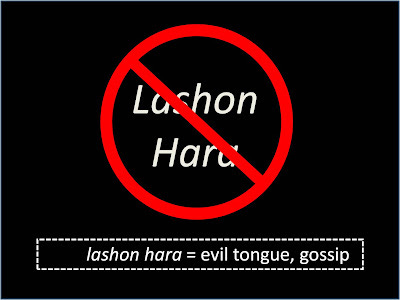Reporting Rabbis Badly
Is it wrong to quote Torah scholars on matters that may reflect them in a bad light?

To clarify - I am not talking about things said in private, in a weak moment. I am referring to statements of ideology said as thought-out policy, which they believe in, but which others consider wrong. For example, if they told their followers that Person X is a rasha, or that the State of Israel is an evil entity.
There are many people who believe that relaying such statements is very, very wrong indeed. However, they don't usually muster detailed arguments beyond "Lashon hara! You are being Mevazeh Gedolim!"
I raised this issue a few months ago, in a post entitled On Being Mevazeh Gedolim. Reader Moshe Abrams pointed out that Rav Yehudah Henkin discusses precisely this question in Responsa Bnei Banim 3:18. The question was raised regarding publicizing a letter written by one rav in condemnation of other rabbonim, which would have the result of raising the ire of many people against this rav.
Rav Henkin replies that it is entirely permissible, and gives three separate reasons for this. The first is that the Talmud demonstrates that it is permissible to relate lashon hara about someone who is a baal machlokes - instigating conflict. Rav Henkin explains the technicalities of this at length, noting that it does not refer to anyone who is involved in a dispute, but rather to someone who is specifically trying to create divisions by delegitimizing others. Rav Henkin does not explain the conceptual rationale to the Gemara's license, but perhaps it is as follows: The problem with lashon hara is that it tears apart society. But if someone is already engaging in efforts to tear apart society, then exposing those efforts is a way to solve that problem.
The second reason given by Rav Henkin is that lashon hara is permissible when it is for public benefit. (He notes that this particular reason must be employed carefully.) While Rav Henkin does not elaborate on how that applies here, I think it is self-evident. If a rabbinic leader seeks to delegitimize another group, it is important for those who are evaluating him as a leader to know about it.
Rav Henkin's third reason is that the rav under discussion himself publicized his words. Since he was quite happy to do so, due to his conviction that his words were appropriate, there is no reason for others to protest that it is against his honor to do so. (Of course, it is crucial that there are no distortions of his words.)
Rav Henkin concludes with a powerful observation. He notes that the people protesting those who publicize the rav's words profess to be very concerned about the honor due to a Torah scholar. But, he asks, why are they not concerned about the honor due to the Torah scholars that this person condemned?
I found Rav Henkin's responsum to be very powerful and relevant. There is a pervasive phenomenon of Anglo charedim, especially those who come from non-charedi backgrounds, being deeply uncomfortable with various statements and positions of many charedi rabbinic leaders. Some of them re-assess whether they really belong in charedi society. But others address their discomfort by trying to suppress any mention of these statements and positions.
Personally, I think that Rav Henkin is obviously correct that it is permissible and even important to publicize such statements and positions. People need to make informed decisions, about which community to associate with, which schools and yeshivos to send their kids to, and which rabbanim to seek guidance from. If the leaders of a society feel strongly about certain things, then this should be known!
There are some important qualifications to be made here. If a rabbi says something that you find deeply objectionable, it certainly doesn't mean that he is entirely disqualified from having anything good to offer. And it may not be relevant or praiseworthy to relay his objectionable positions if, for example, someone is merely having a discussion about a shiur given by this person on an unrelated topic. But when people are making life decisions based on rabbinic leadership, they should be informed about the views and positions of this leadership.
Again, I am not talking about trashing people by relating their shortcomings, which is a more complicated matter - sometimes important, often wrong. I am talking about publicizing positions of rabbinic leaders that the rabbinic leaders themselves hold to be true and to be important to share with at least some of their followers. Anyone who opposes this needs to take a good hard look at themselves, and to ask themselves what they really think about this person, and what exactly is making them uncomfortable. The truth can be painful, but don't shoot the messenger.
See also these posts:
On Being Mevazeh the Gedolim
When Lashon Hara is a Mitzvah
The Angst of Anglo-Charedi Converts


